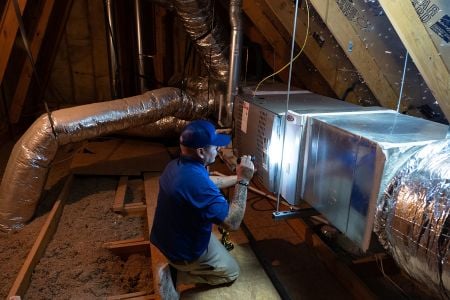Poor IAQ May Affect Heart Health
Learn How Professional Indoor Air Quality Inspections Can Help
Maintaining a healthy home means paying attention to your Indoor Air Quality (IAQ), an often-overlooked aspect of well-being. However, poor IAQ can pose significant health risks, particularly to heart health. Understanding how residential IAQ impacts your cardiovascular system and taking practical steps to address it can help protect your family and create a safer living environment.
The Connection Between Indoor Air Quality and Heart Health
The air you breathe inside your home plays a critical role in your overall health, particularly your cardiovascular system. Everyday activities like cooking or cleaning, as well as poor ventilation, can release pollutants such as particulate matter, carbon monoxide, and volatile organic compounds (VOCs) into the air. These irritants can inflame your lungs, and that inflammation increases the risk of heart disease. Prolonged exposure to poor indoor air quality has been linked to conditions like irregular heart rhythms, high blood pressure, and an elevated risk of heart attacks. For individuals with pre-existing heart conditions, the dangers of poor IAQ are even greater, making proactive measures essential. Since the cardio-pulmonary systems work together to deliver oxygen to the body, maintaining better air quality supports efficient oxygen exchange and reduces the strain on your heart.
Common Residential Sources of Poor IAQ
Many household factors can cause poor IAQ to occur, including:
- Dust and Allergens: House dust mites, pet dander, and pollen can become suspended in the air, especially where homes do not have appropriate air filtration.
- Mold and Mildew: Unchecked moisture problems can lead to mold growth that can trigger respiratory and heart conditions.
- Chemicals and VOCs: Cleaning products, paints, and certain building materials emit VOCs, adding to health problems.
- Combustion Pollutants: Gas stoves, fireplaces, and heating systems that are not well-vented may produce poisonous gases like carbon monoxide and nitrogen dioxide. Crawlspace foundations often harbor unwholesome air.
Simple Steps to Improve Residential IAQ
Improving indoor air quality doesn’t have to be a daunting task. Here are some practical steps:
- Ventilation: Simply opening windows and using exhaust fans can help remove stale air and indoor pollutants. Proper ventilation encourages fresh air circulation, diluting contaminants and creating a healthier indoor environment.
- Filtering Air: Setting up HEPA filters can capture most of the airborne pollutants in an HVAC.
- Control Humidity: Maintain indoor humidity levels between 30% and 50% to prevent the growth of mold and mildew. Using dehumidifiers can help regulate moisture levels, creating a healthier and more comfortable living environment.
- Eliminate Sources of Pollution: Opt for low-VOC paints and cleaning products. Regularly inspect your home for potential carbon monoxide leaks to ensure a safe and healthy indoor environment.
- Schedule Professional IAQ Assessments: Regular inspections by certified professionals can uncover hidden issues and ensure safe air quality in your home.
Why Professional IAQ Services Are Important
Although simple DIY measures can improve IAQ, a professional assessment provides a more comprehensive evaluation of your home. IAQ specialists use advanced tools to identify different pollutants, pinpoint problems, and suggest appropriate mitigation solutions. Addressing hidden issues early minimizes the risk of long-term exposure, helping to protect your family’s health and well-being.
Protect Your Home and Your Heart
Poor indoor air quality should never be allowed to jeopardize heart health in your family. Here's how you could make your home a safer place to live. At AdvantaClean, we offer residential IAQ assessments and solutions so your home will be a healthy haven for you and your loved ones.

Call AdvantaClean at (877) 800-2382 to schedule your IAQ evaluation and know your home is safe and your family's heart health is protected.